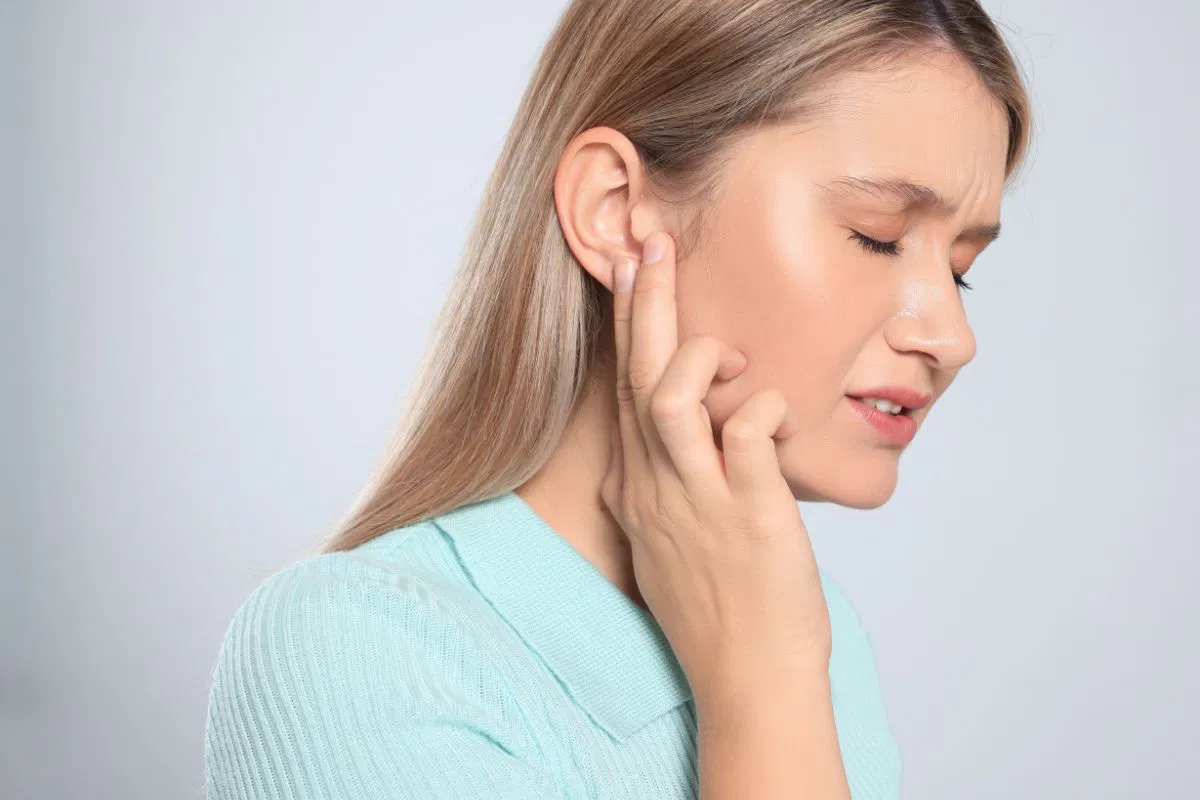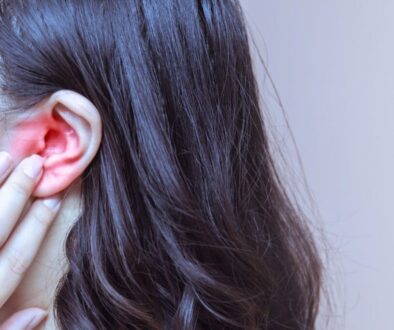How to Drain Ear Sinus Fluid Without Hurting Your Ears

Published on February 18, 2026
Feeling that annoying fullness, pressure, or muffled hearing in your ear? It’s not just uncomfortable—it could be fluid buildup linked to your sinuses. When Eustachian tubes (canals connecting your middle ear to your nose and throat) get blocked, fluid builds up, causing these frustrating symptoms. Knowing how to drain ear sinus fluid safely can help relieve discomfort and protect your ears from further irritation or damage.
In this article, we’ll explore safe, practical ways to relieve pressure, promote drainage, and prevent future buildup—using home techniques, medical options, and probiotics.
What Is Ear Sinus Fluid?
Your ears and sinuses connect through the Eustachian tube, which balances pressure and drains fluid from the middle ear. Infections, allergies, or colds cause congestion and can block these tubes.
When fluid doesn’t drain, it builds up in the middle ear, causing pressure, fullness, and muffled hearing.
Common Causes Of Ear Sinus Fluid Buildup
Several factors can block your Eustachian tubes. Identifying these triggers is the first step toward relief.
- Allergies, colds, and sinus infections: Inflammation narrows the Eustachian tubes and risks blockage.
- Ear infections: Infections affecting the middle and outer ear can lead to trapped fluid.
- Nasal inflammation: Chronic rhinitis or sinusitis often contributes to blockage.
- Structural or anatomical issues: A deviated septum can restrict airflow and drainage. Enlarged adenoids can have the same effect.
Recognizing The Symptoms
Common signs of ear sinus fluid buildup include:
- Pressure or fullness in the ear
- Crackling or popping sounds when swallowing or yawning
- Dizziness or mild balance issues
- Muffled hearing or temporary hearing loss
- Dull ache or headache
If symptoms include severe pain, fever, or discharge, seek medical attention promptly.
Safe And Effective Ways To Drain Ear Sinus Fluid Naturally
Gentle, non-invasive home methods are often the best first step. Below, we outline how to drain ear sinus fluid at home using safe, effective remedies. Always consult a healthcare professional if symptoms are severe or don’t improve.
Massage Techniques
Ear sinus fluid massage can help stimulate lymph nodes and encourage drainage:
- Place your index finger in front of your ear near the jaw joint and your middle finger just behind your earlobe.
- Gently rub downward several times a day to help move fluid away from the ear and relieve pressure.

Steam Inhalation And Warm Compress
Warmth and moisture loosen mucus and relieve congestion.
- Steam: Inhale warm vapor from a bowl or basin of hot water or take a steamy shower to thin mucus and open the Eustachian tubes.
- Warm compress: Apply a damp, warm cloth to the ear for several minutes to ease pain and encourage drainage.
Nasal Irrigation (Saline Rinse Or Neti Pot)
Using a saline rinse can clear mucus and allergens, easing pressure on the Eustachian tubes. Always use distilled, sterile, or boiled water with a Neti pot or saline rinse bottle. Follow the instructions carefully for safe and effective use.
Hydration And Humidifiers
Stay hydrated and use a humidifier to keep mucus thin and nasal passages moist, especially if the air is dry.
Gentle Exercises And Jaw Movements
Yawning, swallowing, or chewing gum can open the Eustachian tubes. Try the Valsalva maneuver (gently exhale with nose pinched and mouth closed) to equalize pressure.
Medical Treatments And When To See A Doctor
If home treatments aren’t effective after several days, or your symptoms are severe from the start, consult a healthcare professional. Medical evaluation is important for persistent or worsening symptoms.
Over-The-Counter Remedies
- Over-the-counter remedies, such as decongestants and antihistamines, may help reduce nasal swelling and open the Eustachian tubes if home care isn’t enough. Ask a pharmacist or doctor if these are suitable for you.
- Use nasal steroid sprays for allergy congestion. (Use as directed; avoid long-term decongestant sprays.)
Professional Drainage Procedures
For persistent cases, your doctor may recommend:
- Myringotomy: A small incision in the eardrum to release trapped fluid.
- Ear tubes: Tiny ventilation tubes inserted to prevent recurrent buildup.
Red Flags That Require Immediate Medical Attention
Seek medical attention immediately if you experience:
- Severe ear pain or high fever
- Significant hearing loss
- Pus or fluid draining from the ear
Preventing Future Ear Sinus Fluid Buildup
Manage Allergies And Chronic Sinus Issues
Consult your doctor to develop an allergy management plan. This may involve antihistamines, nasal sprays, or other prescribed treatments to manage inflammation.
Maintain Good Ear And Nasal Hygiene
Don’t use cotton swabs or objects in your ear canal—they can push wax deeper and cause damage. Gentle nasal rinsing helps keep sinuses clear.
Probiotic Maintenance To Balance The Upper Airway Microbiome
Preventing ear and sinus fluid buildup requires more than clearing blockages. Your upper respiratory tract’s microbiome affects sinus and ear health. Bionaze, with its two patented probiotic strains—BLIS K12™ (Streptococcus salivarius K12) and BL-04™ (Bifidobacterium Lactis BL-04), supports your health by:
- Promote beneficial bacteria in the ear, nose, and throat.
- Reduce harmful pathogens that trigger chronic congestion or infection.
- Support long-term sinus and ear comfort naturally.
Support Long-Term Sinus And Ear Comfort Naturally
Avoid cigarette smoke and pollutants. Use an air purifier for cleaner air, and stay hydrated to keep mucus thin.
Frequently Asked Questions
How long does it take for ear sinus fluid to drain naturally?
Drainage usually takes days to weeks, depending on the cause. A cold might clear in a week. Chronic allergies can prolong it.
Can sinus drainage cause ear pain or pressure?
Yes, sinus congestion can block the Eustachian tube, causing pressure and pain in the middle ear.
What’s the safest way to drain sinus fluid from the ear at home?
Gentle, non-invasive methods include steam inhalation, warm compresses, staying hydrated, and carefully performing the Valsalva maneuver.
When should I stop trying home remedies and see a doctor?
See a doctor if your symptoms last over two weeks, are severe, or include fever, hearing loss, or discharge.
Why Choose BioNaze?
If you suffer from recurring ear and sinus issues, prevention is crucial. BioNaze uses two patented probiotic strains, BLIS K12™ (Streptococcus salivarius K12) and BL-04™ (Bifidobacterium Lactis BL-04), to introduce beneficial bacteria into your upper airway. This helps crowd out harmful pathogens that cause chronic sinus, ear, nose, and throat issues, providing a natural defense to help you stay at your best.

Safely Drain Ear Sinus Fluid And Support Lasting Ear Health
Knowing how to drain ear sinus fluid without hurting your ears empowers you to manage discomfort effectively. Safe home remedies like steam, massage, and gentle exercises can relieve pressure and fullness. While patience is key, know when to seek professional medical attention for severe or persistent symptoms.
Ready to improve your sinus and ear health? Strengthen your body’s defenses with BioNaze. Our formula uses two patented probiotic strains to prevent chronic sinus, ear, nose, and throat issues.
Benefit From The Latest Advancements In Probiotic Science With Bionaze
Bionaze is a proprietary blend of probiotics proven to promote ear, nose, and throat health, improve digestion, and support your immune system. The active ingredients BLIS K12, and BL-04 are considered among the best probiotics according to science.
Get 25% Off Your First Order when you use BIO25 at checkout!

This Content Has Been Reviewed For Factual Accuracy
This content has undergone thorough fact-checking by our team of internal experts. Learn more about the meticulous editorial standard for our website here.
ADVERTISEMENT

About The Author
Hi, I’m Corinne Grace, a proud nursing graduate from Riverside College with a flair for writing. I specialize in health and wellness topics, using my educational background to weave informative and attention-grabbing articles that appeal to a wide variety of readers.




